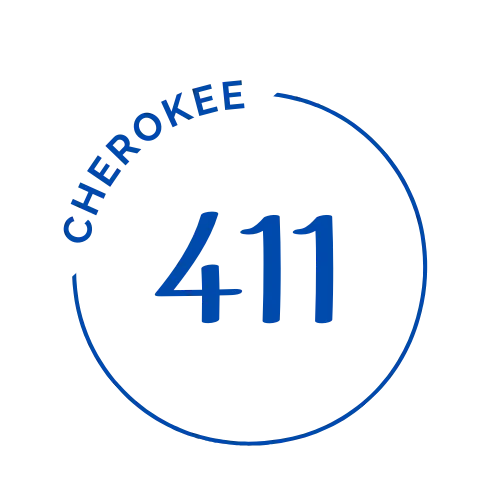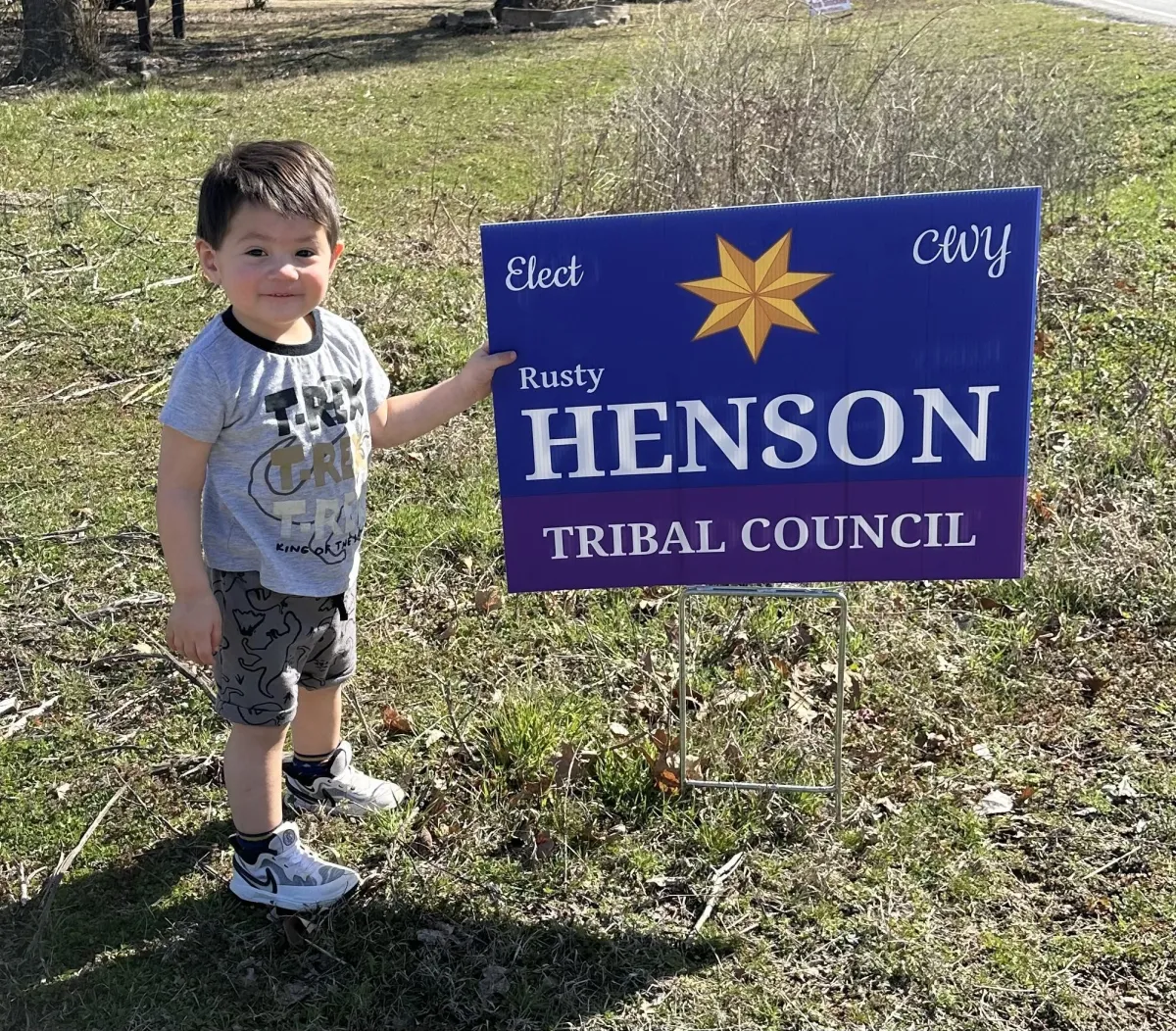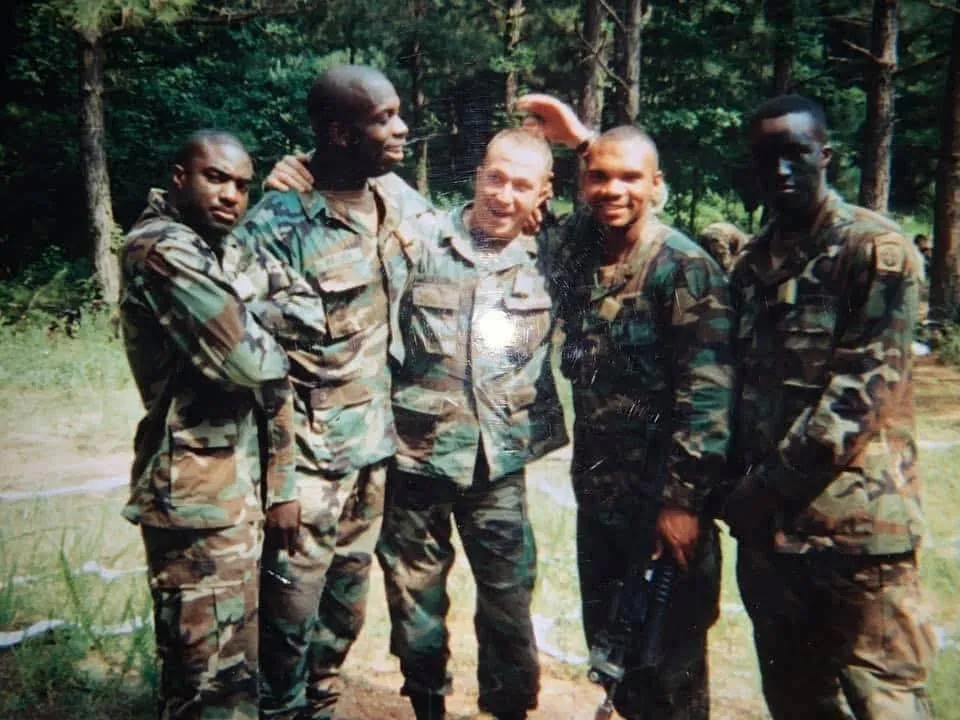
Independent Media: Real, Relevant, and Unfiltered
Cherokee Nation Candidates 2025

Rusty D. Henson
District 9 Candidate
Cherokee Nation Tribal Council
1. What or who inspired you to run for office?
Inspiration to do something can come in many forms and my inspiration to run for office is no exception. As many inspirations come from leaders of various governments, I had to look no further than to my parents for inspiration. My Cherokee mama instilled in me a desire – no, a mandate, to help others. Because of her, my Christian upbringing taught me that to help others was something we were supposed to do and I never thought of not trying to help my fellow man. To serve others is to serve God. My father lived by serving others and helping his community. He was always sending little league teams to tournaments and helping churches with various needs. With my parents serving as my teachers and mentors, I found myself with an unquenchable desire to help as many people in my life as possible, even at the expense of creating a hardship for myself. While serving our Creator and my family will always be the priority, the serving of others has always been and always will be my calling from above. While my parents taught me the importance to serve, my service in the military, particularly in combat, solidified why I do what I do. To look in the faces of children in war-torn countries when I would hand them a bottle of fresh water, or a pre-packaged meal was all the reward needed to know that doing the right thing is what life is all about.
2. What do you see as the biggest challenges facing your district right now?
The biggest challenge facing the district right now can be summarized into one word – sustainability. District 9 has been blessed with many benefits from the COVID-era monies. We have a beautiful new building in Kenwood and soon to have one in Piney. It warms my heart to see them used daily and their impact in the community. The one concern I have about this is regarding the sustainability in future years. For months, I’ve asked how the communities were going to support keeping the lights on for a $20M building when the Cherokee Nation budget is expected to drop by $1M in 2028? Can a community of 300-400 pay the bills? Will they get help? I have been able to get any answers except that it is “hoped” that the federal government will support these projects in the future. They teach us in the military that “hope” is not a method. Aside from sustainability, many of the challenges facing District 9 are not unique to the rest of the nation: 5,000 citizens on the housing wait list (and 9,000 more expected in next decade), over a year wait to see a Cherokee Nation audiologist, Mental Health system breakdowns (not unique to the entire nation), lack of resources for farmers and ranchers, and a dying culture and language. We claim these as priorities but where we spend our money says otherwise. One-half of one percent of our budget goes to our language department. I’m not sure that qualifies as a priority.
3. What are the biggest challenges facing the Cherokee Nation right now?
Housing, Healthcare (including mental health), Cultural and Language Preservation are all challenges that have existed for decades. We have had opportunities to remedy some of these challenges ($2B in Covid money that would have wiped out the housing waiting list and still been plenty of money for stipends), but have consistently prioritized our funds elsewhere. New healthcare facilities are nice but nearly everyone who uses Cherokee Nation health services would rather have better access. For example, the dental clinic I attend currently has 5 of 8 authorized dental hygienists – and I’m told other clinics are less. However, our budget report sounds the alarm on our upcoming financial woes and, on page 8, suggests that “all positions to be filled must be justified and approved by the Chief of Staff or Secretary of State,” and “Review large open commitments to determine if changes in scope and/or quantity could be made.” In other words, it’s recommended that we pinch pennies now, not later. Most citizens are not aware, but our 2028 (and beyond) projected budget is expected to be over $1 BILLION dollars less than it is now (pg. 43). Did I mention my concern about sustainability? Even when we were given these funds, we were warned that, “care should be taken to avoid creating new programs or add-ons to existing programs that require an ongoing financial commitment.” (ARPA guidance). Have we done that?
4. What solutions do you want implemented to address the challenges facing your district and the Cherokee Nation?
I have campaigned on three major things – Culture, Community, and Civility. I have added a fourth “C,” that of Communication. Preserving our language and CULTURE has always been a priority for me and I would like to see us implement more effective language programs, especially mentorship programs that pairs our Cherokee speaking elders with our youth. Keeping our elders and our youth engaged with each other is critical to preserving our culture. We must do better than 0.5% of our budget going toward our language department (budget pg. 136-38).A large part of D9 is Delaware county, the second highest agriculture-producing county in Oklahoma. With Oklahoma consisting of 73% farmland, I would encourage an more agriculture assistance for our farming COMMUNITY. We have an amazing Cherokee Veterans Center that serves all veterans in the Nation, not just citizens. While they do a great job, I would encourage better communication to the veterans about upcoming events and opportunities. Many times, the veterans find out about events only AFTER an event occurs. Financially, housing and medical doesn’t have to be backlogged or understaffed. We have/had the funds for this. It’s about priorities. I will work hard to ensure that we find solutions to keeping medical staff at or near full levels and minimize our housing needs. COMMUNICATION is a problem. Period. I will work to make the restore the practice of making reports given at council committee meetings available to the public as they are being discussed.
5. Can you work with others who do not share your views to help remedy the needs of your district and the Cherokee Nation? Please provide examples of past experiences where you worked with others who disagreed with you then or in the past and created a positive outcome.
CIVILITY has been a pillar of my campaign from day one. It is imperative that we must be civil in our dealings with federal, state, and local officials. It is absolutely critical that we maintain civility with other tribes. While it is inevitable that there will be disagreements (especially with our current state leadership), we must stay at the table. We must remain engaged with the UKB and other tribes to work together. Separate, we are just one tribe. Together we are mighty. While the military is a structured chain of command, I was often tasked with dealing with major conflict between military and major logistical private contractors. I would often fly to mediate and provide resolution for work disputes that were often necessary. The safety of U.S. troops and the entire coalition sometimes depended on my success. In each case, we arrived at a peaceful solution and our equipment was maintained and our safety secured. I have found that in situations of disagreement, there is usually more commonality and differences. Often, the parties agree on the outcome – it’s the path to get to the destination that is the conflict. With my education and experience in law enforcement and counseling, finding a less-than-peaceful solution to problems is not an option. I will continue to use these skills with other entities, fellow tribal councilors, and the public to provide a suitable solution for all involved.
6. What experiences do you feel you bring to the table that make you qualified for the Cherokee Nation Tribal Council?
In 1988, I chose to become a schoolteacher. I knew that it was one of the lowest paying jobs in existence and I knew it was one of the most underappreciative. However, I did it anyway. In 1991, I got my Bachelors in Elementary Education and became a teacher in Delaware County (and coach, and bus driver.). I continued my education later earning Master’s Degrees in Counseling and Psychology as well as Educational Administration. After serving 15 years in public education with various roles, I was called to combat in Iraq, which I was proudly activated for over a year. While in combat, I badly injured my shoulder and, after 20 years of various military Army service, was honorably discharged with the rank of Major. I then returned to school and earned degrees in Criminal Justice and was the Outstanding Graduate in Military History. However “educated” I may be, it means nothing unless it can be applied to real-life. These various areas are in near direct alignment with things the Cherokee Nation supports. My “jack of all trades, master of none,” background allows me the unique position to understand what it is the council does in each area. Particularly useful is the couple of years I spent as a full-time Federal Army Technician that was responsible for a $600M budget of the Federal side of the Oklahoma Army and Air Guard. I can sort through the 154-page budget and determine where our priorities really are.
7. Why do you think voters should trust you?
Why should voters trust a politician? Until they’ve proven themselves satisfactory, they shouldn’t. Why should voters trust me? Same answer - with one difference - I don’t want to be a politician. I want to be a servant. Unfortunately, being a councilor requires a little political work. I will do all I can to take the politics out of it and keep the civility in. I WILL have regular town halls throughout the district to get your input. Whoever is elected WORKS FOR YOU, the citizen, not just the voter. Please don’t let me or whoever it is forget that. ALL politicians need reminded of that all the time. I’m not going to ask you to trust me blindly. Make me prove myself to you and earn that trust. Let me listen to your concerns and needs and take them to the council and fight for you. I might not always agree with you BUT – I’m not running to pass my agenda. I’m being elected to fight for yours!
8. How will you balance the legislative and executive branches of the Cherokee Nation?
Article V of the current Cherokee constitution states, “the powers of the government of the Cherokee Nation shall be divided into three SEPARATE branches: Legislative, Executive, and Judicial; and except as provided in this constitution, the legislature, executive, and judicial branches of government shall be SEPARATE AND DISTINCT and NO BRANCH shall exercise the powers properly belonging to either of the others.” This clearly lays out that our form of government should have the checks and balances laid out in Civics 101. The council is, of course, the legislative body designed to pass legislation and appropriate funds. While request and even recommendations can be made from other bodies, they are just that – requests. No councilor should blindly pass any legislation, especially those relating to money. Each piece of legislation should be carefully read, considered, and passed or rejected based on the merits of the legislation, not on the request of another body unless the merits are congruent with its passage. This is clear in our constitution and will be followed by me during my term in office.
9. What does balance between the branches of the Cherokee Nation government mean to you?
In continuation of the previous question, our constitution is quite clear that the branches of our government shall be “separate and distinct and no branch shall exercise the powers properly belonging to either of the others.” There really is no alternative interpretation of this. Each branch should be separate. Period. One branch does NOT have more constitutional power than another and each branch should INDEPENDENTLY act on its own accord without respect to the other branches. This is designed to keep the other branches “in check” and each branch maintain their “balance” of power. One thing is clear, the ultimate power is with the power of the people and is the reason elections are so important. The people are our “employers” and can and should hire and fire us when we are not serving their best interests.
10. Please provide examples of how you would want to improve transparency in the Cherokee Nation government.
Have you ever been to or watched a council committee meeting on YouTube? Most are reports from the different departments within the Nation. The department head or his/her designee usually goes to the podium and mentions that the councilors have the report in their packet and asks if they have any questions. Sometimes there is one or two – most of the time, there is none. They sit back down and the same happens with the next report. Many committee meetings last no more than 10-15 minutes. The exception is usually the Health committee in which Dr. Jones does a good job providing updates and that is greatly appreciated. A few years ago, the Cherokee Legistar website would have these reports under the ‘Reports’ tab. A citizen could see the information being discussed. This is no longer the case. Full transparency should be available to those in which Council decision affect the most – it’s citizens. As much as legally possible, I will give updates at town halls and various methods that would reach those interested. Citizens want to know how tribal money is being spent - including who the Cherokee Nation sends $1M in political contributions to.
11. Please provide examples of how you would want transparency improved in the Cherokee Nation Businesses.
In the Cherokee Nation budget, CNB is part of “Component Units,” which also consists of funds from the Housing Authority, Cherokee Health Partners, Cherokee Home Health, and Cherokee Nation Foundation (Scholarships). Together, these “Component Units” comprise only about 3% of the Cherokee Nation budget ($112M out of $3.6B). When considering the Gaming Commission expenses ($40M), this number is reduced to about $2M. The amount of stand-alone CNB contributions does not seem to be disclosed but is only a part of the “component units.” In other words, we don’t know how much CNB contributes to CN budget but it’s not as much as you think. The “casino money” is very minimal. Simple Math and knowledge that 37% CNB NET profit must go to the CN tells us that 11 casinos only NET about $300M/year. We know there must be much more involved before salaries, bonuses, expenses, etc. I am told it is not disclosed as not to reveal information to the competition. When campaign finance disclosures are revealed, the CNB influence is obvious and brings more curiosity. Would it be too risky to list salaries of executives and board members, at least? The fear of competition makes a little sense but release of this type of information would be a step in the right direction of regaining the citizen’s trust.
12. Do you think the Cherokee Nation is providing adequate health care for its citizens? Please provide examples.
Cherokee Nation Health has made some great strides in some areas and in some areas, it has much to improve upon. For example, ten years ago, seeing someone for an orthopedic problem would be nearly out of the question. Today, Tahlequah has an amazing orthopedic department that I, unfortunately, had to use last year for a knee surgery and will use again in the coming months. They have been amazing. While it takes awhile to get an appointment in my local dental clinic (due to staffing), I have nothing but good things to say about my experiences there. There are many, other, wonderful stories, that I have heard of the healthcare options that have been made available. Unfortunately, some areas are still challenges and referred care doesn’t always work. Audiology seems to be a common theme across the district. Referrals within the CN can take over a year to see the audiologist and is often cancelled when the appointment approaches. At the last Health Committee meeting, Dr. Jones mentioned the very limited Chiropractic care available and was only used in specific cases. It is important to get feedback from our citizens and to also tell them what is new and available for them. Citizens need care. Many, if not most, want good, adequate care, regardless of how old the building is. New buildings are great and are appreciated! But staffing takes priority over a building every time.
Rusty D. Henson
918-213-5282


